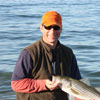Boat Safety: An Ounce of Prevention
By Tom Keer
Jul 06, 2016
Avoid boating accidents with three tips to keep you, your crew, and your boat safe this summer. Learn who has the right-of-way, how to handle a wake, when to help a grounded vessel, and more!
It's summer, and everyone wants to get a boat on the water. But what do you do when other boaters don't follow even basic rules of the road? Slow the pace down. Here are three common situations and how to avoid them.
How to Avoid Boating Accidents
- Boats following too close when exiting or entering a harbor. When someone is riding your stern the natural reaction is to speed up. Pushing the throttle forward in a no-wake zone with a maximum speed of 6 MPH can get you flagged. Rather than get a ticket, maintain your course and speed.
- The lead boat is called the stand-on vessel while the following boat is called the burdened vessel. To pass properly, the burdened vessel should give two air horn blasts to ask the stand-on vessel permission to pass. If passing is approved, the stand-on vessel offers two return blasts to acknowledge. If the stand-on vessel offers a return signal of 5 blasts it means 'unsafe to pass.' If the burdened vessel passes anyway, then the boating rules say to give way. Be ready and have your crew hold on to rails or sit down to absorb the wake.
- Boats cutting you off and leaving a wake. Boats coming from the right are the stand-on vessel and they have the right of way. But sometimes boats come from all different directions, and when they do they leave a wake. How to handle? First, slow down. Second, alert your crew to the bumps so they can grab a rail or sit down. Third, cross the wake on a 45-degree angle so you ease over the wave rather than catch air followed by a crash.
- Boats that run aground. It's tempting to rush in to help, but be careful. First, assess the situation to make sure passengers are ok. Then, determine if you and your boat/crew can safely extricate them and their boat. If you can tow a boat off a bar, then help. If it's too dangerous or the boat is taking on water, radio for help. Call Mayday three times on VHF channel 16, provide your registration number or call sign, and report the emergency. If the situation is non-life threatening, radio the Harbormaster on VHF Channel 9.
Popular Posts









